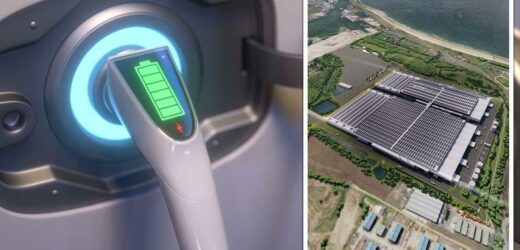Jeremy Vine caller slams Johnson over energy cost crisis
We use your sign-up to provide content in ways you’ve consented to and to improve our understanding of you. This may include adverts from us and 3rd parties based on our understanding. You can unsubscribe at any time. More info
The UK’s plans to phase out petrol and diesel cars have been dealt a major blow as Britishvolt, which is building the country’s first large-scale electric battery manufacturing facility, has been forced to push back production to mid-2025. The plant looks set to build around 300,000 electric battery packs a year, with a total capacity of over 38 GWh by the end of the decade
Due to soaring energy costs, the startup has been forced to delay production by three years.
Speaking to the Financial Times, Orral Nadjari, the co-founder and former CEO of Britisholt, noted that a combination of factors resulted in the delays for the gigaplant.
He said: “It does go hand-in-hand with the fact that we have inflation, we have a recession and we have geopolitical uncertainties.
“The main facility will be delayed slightly into mid-2025.”
He added that soaring costs of energy had forced the company to halt major construction works at its new site in Blyth, Northumberland, until February.
Worth £3.8billion, the plant is one of the UK’s biggest-ever industrial investments and the largest in the North-East of England since Nissan first arrived in 1984.
In July, the company confirmed it will receive Government funding support for the building of its £3.8billion gigaplant in a major step forward for Britain’s EV market.
The confirmation comes after Prime Minister Boris Johnson first made the commitment back in January through the Government’s Automotive Transformation Fund (ATF)
The ATF is a funding programme worth up to £1billion created to support large-scale industrialisation and for the development of a high-value EV supply chain in the UK.
With the help of Government support, the plant will create around 3,000 direct and 5,000 indirect jobs, and play a major role in strengthening the UK’s technological hub.
Britishvolt has attracted investment from a number of major players, including £1.7billion from the real estate investor Tritax alongside the asset manager abrdn.
The company has also signed a deal with the commodities giant Glencore, who has agreed to supply cobalt for its batteries as part of a long-term agreement.
The Prime Minister had previously described Britishvolt as part of the “UK’s place at the helm of the global green industrial revolution”.
DON’T MISS:
Heat pumps: ‘Gimmick’ incentive plan torn apart- benefits wealthy [REVEAL]
Race to install solar panels as energy prices surge [REPORT]
Smart meter warning: Can energy providers switch off your devices? [INSIGHT]
However, according to a new report by the Faraday Institution, the UK is still at risk of falling behind, as EU countries, particularly Germany, are set to rapidly scale up production.
Most recently, Jaguar Land Rover (JLR) warned that it is “exploring all options” on the supply of batteries for its electric vehicles as the UK is currently failing to deliver on their requirements.
Tata Motors, which owns JLR is reportedly in talks with foreign battery makers Northvolt and SVolt Energy Technology, to source critical supplies for their EVs.
Experts have warned that such a loss of a potentially huge contract could signal doom for the country’s automotive industry.
Source: Read Full Article





